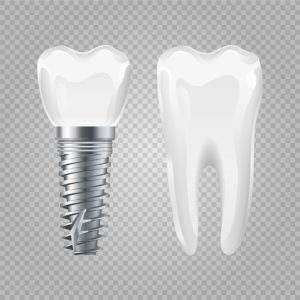25 Aug How long is the dental implant process?
 When you have an unsightly gap in your smile, you likely want to address it as soon as possible so that you can smile with confidence again and be able to chew and speak properly. Therefore, it’s helpful to know what treatment timeline to expect with dental implants.
When you have an unsightly gap in your smile, you likely want to address it as soon as possible so that you can smile with confidence again and be able to chew and speak properly. Therefore, it’s helpful to know what treatment timeline to expect with dental implants.
There are a number of factors that can influence the course of treatment in each unique patient case, so it’s best to talk to an oral surgeon to learn about the relevant considerations in your case. Some circumstances may require supplemental treatment that require longer treatment periods.
Dental Implant Treatment: What to Expect
The process of getting dental implants begins with an evaluation of your case, in which the oral surgeon gathers information needed to assess the patient’s suitability for dental implant placement and to plan and prepare for that treatment. The surgeon will assess the quality of bone tissue at the site to determine whether there is sufficient bone to support the osseointegration process in which the dental implant becomes fixed in the jaw.
If the patient is ready to proceed with dental implant placement, the procedure can be scheduled in our outpatient surgical suite. Depending on the number of implants being placed, the appointment may last for several hours.
Some patients may be able to have their restorations placed the same day that dental implants are placed. Others may have to wait to be fitted with the restoration until osseointegration is complete. Talk to your surgeon to see what is possible in your case.
Factors That May Influence the Dental Implant Treatment Timeline
A number of factors can affect the dental implant treatment process and the amount of time it will take.
- Suitability of the dental implant site: Dental implant success is dependent on the quality of bone tissue at the site. If the patient has experienced bone loss or has a congenital bone deficit, preliminary bone grafting may be needed before dental implants can be placed.
- Other conditions that warrant treatment: Dental implant placement cannot happen if the patient has uncontrolled gum disease, so that condition must be treated first. There may be similar considerations for other systemic conditions, such as diabetes or heart disease.
- Patient adherence to post-operative instructions: Complications after dental implant placement, particularly infections, can lead to a longer treatment timeline. Patients should closely adhere to post-operative instructions to minimize their risk of infections.
Are you interested in dental implants as a solution for tooth loss? Visit Central Oklahoma Oral & Maxillofacial Surgery Associates for a consultation to learn about what to expect in terms of treatment and results for your specific situation.
